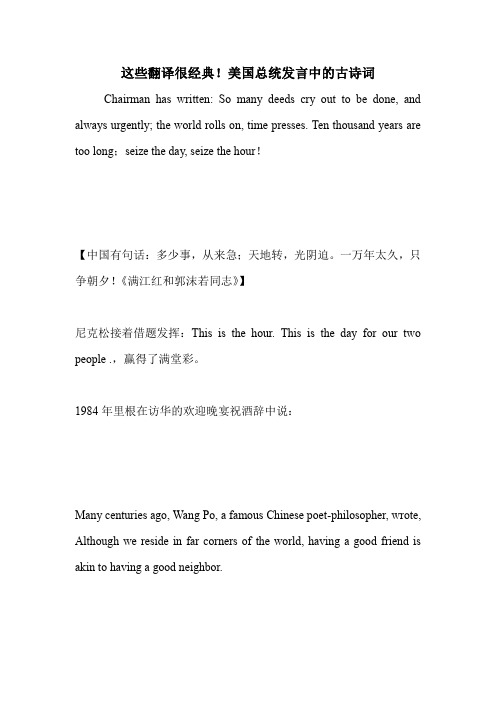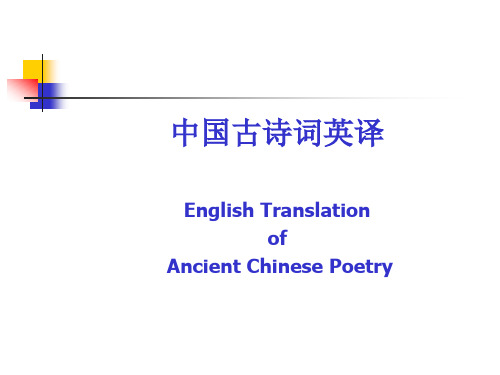经典古诗英文翻译
中国古诗词英译

诗歌是讲意境的,意境包含两层含义: 一是诗歌的内容是有意蕴的,有着相当的文化内涵,诗歌的 意境和意味便来源于意蕴。艾略特所说的诗歌的可理解性、超民 族性指的就是这个。 诗歌的意蕴决定着诗歌的意义符号系统(sign system),诗歌 的可译性基本取决于此。诗歌的意蕴要素有情感、意象、情景、 人物、事件等是可译的。 当然,在一种语言符号系统中所包含的某些意蕴并不一定能 在别的语言符号系统中找到对等的意蕴,尤其是一个民族所独有 的文化意蕴。比如,中国文化中“君子”好逑、潇湘之“兰”这 两个意象的文化意蕴在西方的任何一个语种中很难找到对应物。 然而,这种意蕴一经阐释,总可以让其他民族的人能了解、理解, 进而达到共鸣。这种诗歌意蕴的可阐释性就是诗歌的可译性。
中国古诗词英译
English Translation of Ancient Chinese Poetry
一. 历史的演绎
中诗英译最早见于16世纪后期出版的 《英文诗艺》(The Arte of English Poesie,1589),译者是英国学者Richard Puttenham,探讨了双语诗词格律。
三.诗歌的韵律
美术、音乐和诗歌是人类文化史上 的三个支柱,从中分别体现出的视觉、 听觉和联想构成了多维的艺术。而这三 种艺术当中,诗歌是通过文字来传达视 觉、听觉、味觉、触觉和其他思维感受 的特殊的媒质。
2. James Legge(1815-1897),英国 传教士,翻译22卷的《中国经典》(The Chinese Classics),其中包括《诗经》 和《楚辞》等。
3.Herbert A. Giles(1845-1935),曾 人英国驻华领事,编译了《中国文学撷 英》(Gems of Chinese Liberature),翻 译介绍了中国历代诗文作品。1901年, 著有《中国文学史》(A History of Chinese Literature),对中国文学的历 史发展作了比较客观而全面的考察和评 述。
这些翻译很经典!美国总统发言中的古诗词

这些翻译很经典!美国总统发言中的古诗词Chairman has written: So many deeds cry out to be done, and always urgently; the world rolls on, time presses. Ten thousand years are too long;seize the day, seize the hour!【中国有句话:多少事,从来急;天地转,光阴迫。
一万年太久,只争朝夕!《满江红和郭沫若同志》】尼克松接着借题发挥:This is the hour. This is the day for our two people .,赢得了满堂彩。
1984年里根在访华的欢迎晚宴祝酒辞中说:Many centuries ago, Wang Po, a famous Chinese poet-philosopher, wrote, Although we reside in far corners of the world, having a good friend is akin to having a good neighbor.【在许多世纪之前,一位名叫王勃的中国哲学家和诗人写过:海内存知己、天涯若比邻。
】一句古诗词还意犹未尽,美国国务院的中国通又为里根在第二天中国总理晚宴上的祝酒辞中引用了《易经》:let us be of the same mind. And as a saying from The Book of Changes goes, If two people are of the same mind, their sharpness can cut through metal.【让我们同心同德,正如《易经》中一句话说的那样:二人同心,其利断金。
】1989年美国总统乔治﹒布什在访华的欢迎晚宴上两度展示他的中国文化功底。
中国古诗词英译..

华裔学者叶维廉翻译了Chinese Poetry: Major Modes and Genres(汉诗 英华,1970),被英美许多大学作为教 材多次重印。
J.D.Frodsham等人编译了Anthology of Chinese Verse(中国诗选集,1967), John A. Turner翻译了A Golden Treasury of Chinese Poetry(英译汉诗金 库,1976),包含了自周至清代120多首 古诗译文。
同期,美国翻译家William McNaughton全面翻译了《诗经》(The Classic Anthology Defined by Confucius, 1971),瑞典汉学家B.Karlgren也英译 《诗经》(The Book of Odes, 1950)。 由Robert Kotewall和Norman L. Smith合 译的The Penguin Book of Chinese Verse (企鹅丛书· 中国诗歌卷),在中诗英译 经典化方面开了先河。
1867年,法国贡古尔学院女院士 Judith.Gautier翻译的中国古诗《玉书》 (Le Livre de Jade)被译成多种语言, 在西方世界引起很大反响。 20世纪德国伟大的作曲家Gustav Mahler把《玉书》德文译本的李白、王 维和孟浩然等作为歌词,写成了享誉世 界的合唱交响乐Das Lied von der Eerde (大地之歌)。
诗歌是讲意境的,意境包含两层含义: 一是诗歌的内容是有意蕴的,有着相当的文化内涵,诗歌的 意境和意味便来源于意蕴。艾略特所说的诗歌的可理解性、超民 族性指的就是这个。 诗歌的意蕴决定着诗歌的意义符号系统(sign system),诗歌 的可译性基本取决于此。诗歌的意蕴要素有情感、意象、情景、 人物、事件等是可译的。 当然,在一种语言符号系统中所包含的某些意蕴并不一定能 在别的语言符号系统中找到对等的意蕴,尤其是一个民族所独有 的文化意蕴。比如,中国文化中“君子”好逑、潇湘之“兰”这 两个意象的文化意蕴在西方的任何一个语种中很难找到对应物。 然而,这种意蕴一经阐释,总可以让其他民族的人能了解、理解, 进而达到共鸣。这种诗歌意蕴的可阐释性就是诗歌的可译性。
思归古诗拼音版

思归古诗拼音版Sī Guī Gǔ Shī Pīn Yīn Bǎn Xiě Chū Xiāng Guān Cān Kǎo NèiRóng 1500 Zì思归古诗是唐朝时期诗人李白的一首著名辞赋。
它描写了诗人思念家乡的情感,表达了对家乡的热爱之情。
思归古诗所用的体裁是辞赋,辞赋是一种古代文学形式,它以叙述、描写、讴歌为主,情感丰富,语言华丽,常用典故、比喻、象征来表达作者的思想感情。
下面是思归古诗的拼音版及相关参考内容。
思归古诗拼音版:白日依山尽,黄河入海流。
欲穷千里目,更上一层楼。
内容解析:这首诗的第一句“白日依山尽,黄河入海流。
”是在描述中国大地的壮阔景象,诗人想要表达的是家乡的广袤和壮丽。
此句中的“白日依山尽”形象地描绘了太阳西沉的霞光,表现了山峰和日落的壮景。
而“黄河入海流”则表现了河流的雄伟和壮观。
这句用意是说,家乡的山山水水,都是如此美丽,诗人因此对家乡充满了深切的思念。
第二句“欲穷千里目,更上一层楼。
”则表达了诗人对家乡的极度思念之情。
欲穷千里目,更上一层楼,意味着诗人已经向极远的地方望去,但还是难以尽情地欣赏家乡的美景,因此想要更高一层楼来远眺,以寻找更加美妙的景色。
思归古诗是李白的名作之一,将自然和人文揉合在了一起,抒发出了诗人深深的思乡之情。
这首诗短小精悍,语言简练,是中国古代文学中著名的辞赋篇目之一。
思归古诗也是经典的中文教材,学生通常在初中、高中等阶段学习。
下面是思归古诗的中文注释及英文翻译。
思归古诗中文注释:白日依山尽:太阳西沉,渐渐地沉入山中。
黄河入海流:黄河的河水流入大海,形势非常壮观。
欲穷千里目:欲:想要,千里目:彼此相距千里之遥的景色。
穷:到达极限。
意思是想要看尽在远处的美景。
更上一层楼:想要登上更高的楼房,以期能看到更可观的风景。
思归古诗英文翻译:Beyond the furthest mountain range,The Yellow River flows into the sea,I long to see beyond the years of age,And climb another giddy height for me.编者注:思归古诗是一首中国著名的古诗,描绘了李白对家乡的怀念之情。
[精品]解析《长干行》的两个英译文本
![[精品]解析《长干行》的两个英译文本](https://img.taocdn.com/s3/m/0c5c35dd8ad63186bceb19e8b8f67c1cfad6eee0.png)
解析《长干行》的两个英译文本解析《长干行》的两个英译文本摘要:许渊冲先生在多年的翻译实践中,形成了一套独有的理论,“文化竞赛论”就是其中之一。
本文运用此理论分析中国古代诗作《长干行》的两个英文译本,以此说明文学翻译是两种语言,甚至是两种文化之间的竞赛。
关键词:优势竞赛论《长干行》许渊冲 1.理论源起――提出“优势竞赛论”的原因许先生平生译著颇多,理论贡献颇丰。
他的理论可以概括为:“美化之艺术,创优似竞赛”,其中“竞赛”指“翻译是两种语言的竞赛,文学翻译更是两种文化的竞赛”。
许先生的理论是众多大家理论基石之上的高度概括、总结和新发现,其中包括鲁迅提出的关于文章的“三美”,钱钟书先生的“化境说”,王国维在《人间词话》中提出的“境界说”,郭沫若的“创作论”和傅雷的“神似说”。
许渊冲说:“我的译论总结了中国自孔子到钱钟书的观点,并加以发展。
”(许渊冲、许均:1998)在多年的翻译实践中,许先生形成了自己的看法。
他渐渐认识到,西方翻译理论主要是研究西方语言之间的翻译(互译)理论问题,而真正解决中西互译实践的理论问题应当依靠的是中西互译的翻译家。
也就是说,中国的翻译理论必须以解决外汉互译这一特定的双语转换所涉及的各种相关因素为研究的出发点和依归。
许先生指出:“直到目前为止,世界上还没有一个外国人出版过中英互译的作品,而在中国却有不少能互译的翻译家。
――而理论来自实践,没有中英互译的实践,不可能解决中英互译的理论问题。
”(许渊冲:2000)正是基于这些认识,许先生提出了“优势竞赛论”。
2.理论的发展形成和发展过程 2.1萌芽阶段许先生早在1982年就指出:“有个外国学者说过:翻译是两种文化的统一。
而在我看来,统一就是提高。
因为两种文化的历史不同,发展不同,总是各有长短的,如果能够取长补短,那不是可以共同提高了吗?从这个意义上来说,翻译又可以说是两种文化的竞赛,在竞赛中,要争取青出于蓝而胜于蓝。
”这是许先生“优势竞赛论”思想的萌芽。
诗经《蒹葭》译文赏析

蒹葭萋萋,白露未晞。所谓伊人,在水之湄。 溯洄从之,道阻且跻。溯游从之,宛在水
中坻。
Close grow the rush leaves, Their white dew not yet dry. He whom I love Is at the water’s side. Up stream I sought him; But the way was difficult and steep. Down stream I sought him, And away in mid-water There on a ledge,
The reed(许渊冲译本) Green, green the reed, Dew and frost gleam. Where’s she I need? Beyond the stream. Upstream I go, the way is long. Downstream I go, She’s there among.
1)增补引导词there 2)增补虚词it 3)增补动词 2,古汉语里偏正词组的中心词可能省略 ,英译时可 能需要补出这个中心词。 3,古文中意合法的复句很多 ,这类句子英译时要根 据句义增补各种关联词语。
(二) 转换
转换是一个广泛的概念。它可以指词类、成分、 语态、正反、语序等各方面的转换。
《诗经》中《蒹葭》的 译文赏析
一,古文英译的难点
(一) 译语中无对等词 通常的处理办法有四点: 1,用近义词语加注解的方法加以处理; 2,将近义词大写使之专有化; 3,音译加注解; 4,造词。 (二) 多义和歧义 (三) 古今、通假
二,基本翻译技巧
(一) 词量增补 1, 无主句英译时至少有三种增补的可能:
高一语文必背古诗词文言文翻译
高一语文必背古诗词文言文翻译高一语文必背的古诗词和文言文中,有许多经典的作品,以下是一些常见的古诗词和文言文的翻译:1. 《静夜思》- 李白床前明月光,疑是地上霜。
举头望明月,低头思故乡。
Translation:Before my bed, the moonlight glows, like frost upon the ground.I lift my head to gaze at the bright moon, and bow it to think of my hometown.2. 《望岳》- 杜甫岱宗夫如何?齐鲁青未了。
造化钟神秀,阴阳割昏晓。
荡胸生层云,决眦入归鸟。
会当凌绝顶,一览众山小。
Translation:How about Mount Tai? The green of Qi and Lu has not yet faded.The creative power has endowed it with divine beauty, the yin and yang divide the dusk and dawn.Waves of clouds rise from the chest, and returning birds enter the eyes.I will ascend to the utmost peak and look down upon the lesser mountains.3. 《岳阳楼记》- 范仲淹庆历四年春,滕子京谪守巴陵郡,越明年,政通人和,百废俱兴。
乃重修岳阳楼,增其旧制,刻唐贤今人诗赋于其上。
楼之观,今则极矣,前人之述备矣。
此则岳阳楼之大观也,前人之述备矣。
Translation:In the spring of the fourth year of the Qingli era, Teng Zijing was exiled to govern the county of Baling. Thefollowing year, the government was smooth and the people were harmonious, and all the abandoned affairs were revived.He then rebuilt the Yueyang Tower, expanded its old system, and engraved the poems and prose of the Tang sages and modern people on it.The view of the tower is now at its peak, and the descriptions of the predecessors are complete.This is the grand view of Yueyang Tower, and the descriptions of the predecessors are complete.4. 《滕王阁序》- 王勃豫章故郡,洪都新府。
上善若水水利万物而不争 汉译英
上善若水水利万物而不争汉译英下载温馨提示:该文档是我店铺精心编制而成,希望大家下载以后,能够帮助大家解决实际的问题。
上善若水水利万物而不争汉译英该文档下载后可定制随意修改,请根据实际需要进行相应的调整和使用,谢谢!并且,本店铺为大家提供各种各样类型的实用资料,如教育随笔、日记赏析、句子摘抄、古诗大全、经典美文、话题作文、工作总结、词语解析、文案摘录、其他资料等等,如想了解不同资料格式和写法,敬请关注!Download tips: This document is carefully compiled by the editor. I hope that after you download them, they can help you solve practical problems. The document 上善若水水利万物而不争汉译英 can be customized and modified after downloading, please adjust and use it according to actual needs, thank you!In addition, our shop provides you with various types of practical materials, such as educational essays, diary appreciation, sentence excerpts, ancient poems, classic articles, topic composition, work summary, word parsing, copy excerpts, other materials and so on, want to know different data formats and writing methods, please pay attention!"上善若水,水利万物而不争" 是道家哲学中的一句经典名言,出自老子的《道德经》第八十一章。
经典古诗英文带翻译欣赏
[标签:标题]篇一:【英语】经典翻译欣赏经典翻译欣赏(中英)目录1. 名言古诗词2. 英语中介词的翻译3. 常用中文新词英译4. 超级人生名言5. 李白诗9种英译版本的欣赏6. 老子道德经译7. 奇特句式:你能译吗8. 丁尼生短诗36种汉译版本欣赏9. 中国热点词汇10. 英语谚语精选11. 生活中的颜色名言古诗词但愿人长久,千里共婵娟We wish each other a long life so as to share the beauty of this graceful moonlight, even though miles apart.独在异乡为异客,每逢佳节倍思亲。
A lonely stranger in a strange land I am cast, I miss my family all the more on every festive day.大江东去,浪淘尽,千古风流人物。
The endless river eastward flows; with its huge waves are gone all those gallant heroes of bygone years.二人同心,其利断金。
If two people are of the same mind, their sharpness can cut through metal.富贵不能淫,贫贱不能移,威武不能曲,此之谓大丈夫。
It is a true great man whom no money and rank can confuse, no poverty and hardship can shake, and no power and force can suffocate.海内存知己,天涯若比邻。
A bosom friend afar brings distance near.合抱之木,生于毫末,九层之台,起于累土;千里之行始于足下。
花木兰英语简介简短
花木兰英语简介简短1.花木兰英文简介带翻译HuaMulanisaheroinewhotooktheplaceofherfatherandjoinedthearm y,describedinafamousChinesepoemknownastheBalladofMulan.Itis unknownwhetherthestoryhasanyfactualbasis.Thepoemwaswrittend uringtheNorthernWeidynasty,andfirstrecordedintheMusicalReco rdsofOldandNewfromSouthernandNorthernDynasties. AccordingthedescriptionoftheBalladofMulan,thekhanofNorthern dynastyorderedtorecruitforthearmytowardoffincursionsbytheRo urannomads.Herfatherneedtoperformobligation.Howere,herfatherissooldthathecouldnotbearsufferingfromthebi tterness,andshehasn'tanelderbrothertogoandfight.SoMulandeci dedtodisguisedherselfintoamantojointhearmyinsteadofherfathe r.Manyyearslater,thebattlewasover.Inviewofhermilitaryexploit, theKhanofNortherndynastyofferedMulanahighofficialposition,b utsheturneddownthepositiontoreturntoherfamily.Shemadeuphers elfaftercomingbackhome.Whenherformercomradesvisitedherathom e,theywereshockedtoseeherdressedasawoman. HuaMulanhasbeenhighlyrespectedasafilialdaughterbytheChinese peopleforhundredsofyears,eventhoughherstorymightbenomorethanalegend.In1998,herstorywasadaptedforananimatedcartooninaDi sneyamusementcenterintheUnitedStates,totheacclaimofallovert heworld.花木兰是中国著名古诗《木兰辞》中描绘的一位代父从军的巾帼英雄,其真实性不详。
- 1、下载文档前请自行甄别文档内容的完整性,平台不提供额外的编辑、内容补充、找答案等附加服务。
- 2、"仅部分预览"的文档,不可在线预览部分如存在完整性等问题,可反馈申请退款(可完整预览的文档不适用该条件!)。
- 3、如文档侵犯您的权益,请联系客服反馈,我们会尽快为您处理(人工客服工作时间:9:00-18:30)。
.' ;.. 《小池》 杨万里 泉眼无声惜细流,树阴照水爱晴柔。 小荷才露尖尖角,早有蜻蜓立上头。 A Small Pond Yang Wanli From fountainheads water streaks out thin and quiet. Soft and Sunny are trees reflected in the pond. A slim lotus leaf, not yet unfurled, scarcely appears When on its pointed tip a dragonfly is alighted.
《黄鹤楼送孟浩然之广陵》李白 故人西辞黄鹤楼,烟花三月下扬州。 孤帆远影碧空尽,唯见长江天际流。 Seeing Meng Haoran Off from Yellow Crane Tower Li Bai At Yellow Crane Tower in the west My old friend says farewell; In the mist and flowers of spring He goes down to Yangzhou; Lonely sail, distant shadow, Vanish in blue emptiness; All I see is the great river Flowing into the far horizon.
《春晓》 孟浩然 春眠不觉晓,处处闻啼鸟。 夜来风雨声,花落知多少。 Spring Morn Spring slumbers unaware of morn, All around one hears the birds' call. Last night, the sound of wind and rain, How many fallen flowers accounted for?
朱熹 《春日》 胜日寻芳泗水滨,无边光景一时新。 等闲识得春风面,万紫千红总是春。 A Spring Day Zhu Xi I seek for spring by riverside on a fine day, O what refreshing sight does the boundless view bring? I find the face of vernal wind in easy way: Myriads of reds and violets reveal only spring. .' ;.. 《忆江南》 白居易 江南好, 风景旧曾谙。 日出江花红胜火, 春来江水绿如蓝。 能不忆江南? Dreaming of the Southern Shore Bai Juyi Fair Southern shore With scenes I adore. At sunrise riverside flowers redder than fire, In spring green waves grow as blue as sapphire, Which I can't but admire.
杜甫 《春夜喜雨》 好雨知时节, 当春乃发生。 随风潜入夜, 润物细无声。 野径云俱黑, 江船火独明。 晓看红湿处, 花重锦官城。
Happy Rain on a Spring Night Du Fu Good rain knows its time right; It will fall when comes spring. With wind it steals in night; Mute, it moistens each thing. O’er wild lanes dark cloud spreads; In boat a lantern looms. Dawn sees saturated reds; The town’s heavy with blooms.
《回乡偶书》贺知章 少小离家老大回 乡音无改鬓毛衰 儿童相见不相识 笑问客从何处来 COMING HOME He Zhizhang I left home young. I return old; Speaking as then, but with hair grown thin; And my children, meeting me, do not know me. They smile and say: "Stranger, where do you comefrom?" .' ;.. 《咏柳》 贺知章He Zhizhang 碧玉妆成一树高,万条垂下绿丝绦。 不知细叶谁裁出,二月春风似剪刀。 The Willow Emerald fashioned into a tall tree Hung with myriad silk braids of green. Who tailored the dainty leaves? The snipping wind of early spring.
《寻隐者不遇》 贾岛 松下问童子,言师采药去。 只在此山中,云深不知处。 Seeking out Hermit without success Jia Dao Beneath the pine I asked the boy, He said master's out collecting herbs. Just somewhere in this mountain here, But deep clouds set me wondering where.
《静夜思》李白 床前明月光,疑是地上霜。 举头望明月,低头思故乡。
Thoughts in the Still of the Night Li Bai A pool of moonlight before the bed, Took it to be frost on the ground. Raised my head to gaze at the moon, And lowered it to think of home.
《望庐山瀑布》李白 日照香炉生紫烟, 遥看瀑布挂前川。 飞流直下三千尺, 疑是银河落九天。
Viewing the Waterfall at Mount Lu Li Bai Sunlight streaming on Incense Stone kindles a violet smoke: Far off I watch the waterfall plunge to the long river, Flying waters descending straight three thousand feet, Till I think the Milky Way has tumbled from the ninth height of Heaven. .' ;.. 《望天门山》 李白 天门中断楚江开,碧水东流至此回。 两岸青山相对出,孤帆一片日边来。
Viewing the Tianmen Mountains Li Bai The split in the Tianmen Mountains allows the Chu River to flow. The blue waters running east turns to eddies here. Green cliffs on both sides gradually unfold themselves. After a solitary sail is coming from where the sun sheds its light.
《早发白帝城》李白 朝辞白帝彩云间,千里江陵一日还。 两岸猿声啼不尽,轻舟已过万重山。
The River Journey from White King City Li Bai At dawn I left the walled city of White King, Towering among the many-coloured clouds; And came down stream in a day One thousand li to Jiangling. The screams of monkeys on either bank Had scarcely ceased echoing in my ear When my skiff had left behind it Ten thousand ranges of hills.
李白 《赠汪伦》 李白乘舟将欲行,忽闻岸上踏歌声。 桃花潭水深千尺,不及汪伦送我行。
Presented to Wang Lun Li Bai Li Bai on board, ready to push off, suddenly heard the tramping and singing on the bank. Peach Flower Pool a thousand feet deep is shallower than the love of Wang Lun who sees me off.
《悯农其二》 李绅 锄禾日当午,汗滴禾下土。 谁知盘中餐,粒粒皆辛苦。 Commiserating with the Farmers Li Shen Hoeing in the paddy under the mid-day sun, Sweat dripping to the soil underneath the plant. Who knows that the meals in our plates, Every morsel of them comes with toil and pains.
